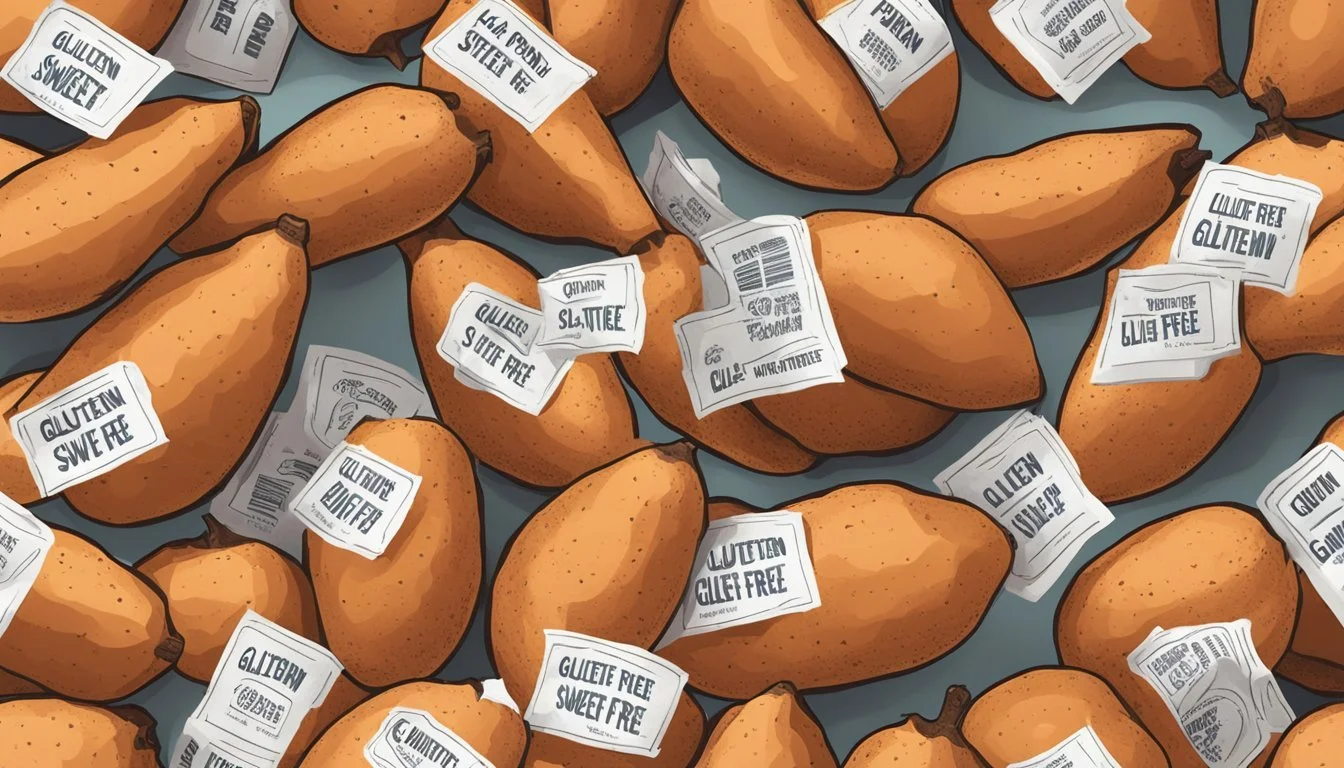Are Sweet Potatoes Gluten-Free?
Exploring Their Benefits for Gluten Sensitivity
Sweet potatoes (What wine goes well with sweet potatoes?) are a nutritious and versatile food that often come up in discussions about gluten-free diets. They are considered a safe option for individuals with celiac disease or gluten sensitivity because they are naturally free from the proteins found in wheat, barley, and rye that cause adverse reactions in these conditions. While the sweet potato itself contains no gluten, it is crucial to consider the context in which it is prepared and served to ensure it remains gluten-free.
Given the rising awareness and diagnosis of gluten-related disorders, there is an increasing demand for gluten-free food options. Sweet potatoes offer a wealth of health benefits, including essential vitamins and minerals, fiber, and antioxidants, making them a valuable addition to any diet. However, in processed or prepared forms, such as in dishes at restaurants or packaged products, cross-contamination with gluten-containing ingredients can occur. It is important for consumers to be vigilant about how sweet potatoes are handled and to inquire about preparation methods when eating out or purchasing pre-made sweet potato dishes.
Overview of Gluten
Gluten is a family of proteins predominantly found in grains like wheat, barley, and rye. It consists of two main proteins: gliadin and glutenin. Gluten is responsible for the elasticity of dough, allowing it to rise and retain its shape, as well as providing a chewy texture.
Individuals with celiac disease have a severe autoimmune reaction to gluten. When they consume gluten, their immune system mistakenly attacks their small intestine, leading to damage and various health issues. Besides celiac disease, some people may have non-celiac gluten sensitivity or gluten intolerance, where gluten can cause symptoms like bloating, gas, and abdominal pain.
A gluten-free diet is essential for those with celiac disease and can benefit those with gluten sensitivities. This diet excludes all products containing wheat, barley, and rye. However, it's important to note that gluten can be present in many processed foods, hence reading labels or consuming whole, unprocessed foods is critical for a strict gluten-free diet.
Gluten-Free Foods:
Legumes
Meats and fish (not breaded or marinated)
Dairy
Grains: rice, quinoa, corn, tapioca, millet, sorghum, and buckwheat
In summary, gluten is a specific protein undesirable for certain individuals' health. Those on a gluten-free diet must be vigilant about their food choices to prevent symptoms and maintain their well-being.
Sweet Potatoes Fundamentals
In exploring the fundamentals of sweet potatoes, it is crucial to understand their botanical roots, their rich nutritional makeup, and the health advantages they can offer. These factors collectively define the importance of sweet potatoes in a diet.
Origin and Classification
Sweet potatoes, belonging to the morning glory family (Convolvulaceae), are not to be confused with regular potatoes. Ipomoea batatas is their scientific name, and despite similar nomenclature, they are distinct from the tubers of the Solanaceae family. Originating in the Americas, they are now cultivated worldwide, especially in warmer climates where they thrive.
Nutritional Profile
Sweet potatoes are a powerhouse of nutrition, encapsulating a variety of essential vitamins and minerals. They are a great source of dietary fiber and carbs, offering around 20 grams of carbohydrates and 3 grams of fiber per 100 grams. Notably, they are rich in vitamin A and provide significant amounts of potassium and manganese.
Nutritional Values per 100g of Sweet Potato:
Carbohydrates: 20g
Fiber: 3g
Vitamin A: 709 µg (79% DV)
Potassium: 337 mg (7% DV)
Manganese: 0.3 mg (15% DV)
(DV= Daily Value based on a 2000 calorie diet.)
Health Benefits
Sweet potatoes are endowed with a remarkable array of health benefits, attributed in part to their nutrient density. The high levels of vitamin A contribute to maintaining a healthy immune system and skin, while the presence of antioxidants helps in protecting against cellular damage. Their fiber content aids in blood sugar control, which can be beneficial for those managing diabetes. Additionally, complex carbs and minerals found in sweet potatoes support brain function and general well-being.
Are Sweet Potatoes Gluten-Free?
Sweet potatoes are naturally gluten-free, making them a suitable food option for individuals with celiac disease or gluten intolerance. Gluten is a protein found in wheat, barley, and rye, and consuming it triggers a harmful response in those with celiac disease. As sweet potatoes do not belong to the grain family, they lack gluten in their natural state.
Consumers should, however, be vigilant about cross-contamination. This occurs when gluten-free items come into contact with gluten-containing foods or surfaces, which can happen during processing, cooking, or serving. It's critical to ensure that sweet potatoes are prepared and served with utensils and cookware that have not been used for gluten-containing foods.
Gluten-Free Preparation Ideas for Sweet Potatoes:
Baking
Roasting
Mashing
Boiling
Steaming
When sweet potatoes are prepared through these methods without the addition of gluten-containing ingredients, they remain gluten-free. Cross-contamination is the primary concern to watch for, especially when dining out or purchasing pre-processed sweet potato products like fries or chips.
For celiacs and others following strict gluten-free diets, it's encouraged to check labels for gluten-free certification and to inquire about kitchen practices to avoid accidental gluten exposure. By taking these precautions, individuals can enjoy the nutritional benefits of sweet potatoes without compromising their health.
Potential Risks of Gluten Contamination
While sweet potatoes are inherently gluten-free, they can become contaminated with gluten under certain circumstances. It is essential for individuals with celiac disease or gluten sensitivity to understand and mitigate the risks associated with gluten contamination to maintain their health.
Cross-Contamination Concerns
Cross-contamination can occur at multiple stages, from farming to food processing to meal preparation. Farming practices may lead to gluten contamination if sweet potatoes are cultivated near gluten-containing crops. Processing facilities that handle both gluten-free and gluten-containing products may inadvertently introduce gluten to sweet potatoes. Restaurants, despite offering gluten-free options, might still pose a risk if they use shared fryers or cooking surfaces for gluten-free and gluten-containing foods.
Examples of contamination sources in restaurants include:
Shared cooking oil with breaded items
Flour coatings, often used on sweet potato fries
Cutting boards or surfaces where wheat products were previously handled
Recognizing Safe Gluten-Free Options
Individuals with celiac disease or gluten sensitivity must carefully select food products and dining establishments to avoid exposure to gluten. To ensure safety, they should look for sweet potatoes and other products with a certified gluten-free label, indicating that they meet strict guidelines regarding gluten content.
To identify safe gluten-free products, consider the following:
Products labeled with a gluten-free certification
Verification of gluten-free claims through manufacturer websites or third-party certifications
Clear allergen statements on labels, delineating the absence of gluten-containing ingredients
In restaurants, communicating one's dietary needs clearly and verifying kitchen practices can reduce the risk of accidental gluten exposure. Patrons should inquire whether the establishment has dedicated gluten-free preparation areas and whether staff are trained to handle gluten-free orders.
Cooking with Sweet Potatoes
Sweet potatoes offer a nutritious and gluten-free option for various cooking methods. They can be baked, roasted, or even steamed to create an array of dishes suitable for those on a gluten-free diet.
Selecting the Right Sweet Potatoes
When choosing sweet potatoes, look for firm roots with smooth, blemish-free skin. They should be free of any soft spots or sprouts. The color of sweet potatoes can range from orange to purple, each with a distinct flavor profile and cooking property. Consider the recipe before selecting; for instance, orange sweet potatoes are typically sweeter and moister, making them perfect for mashed or baked dishes.
Storage and Preparation Tips
Sweet potatoes should be stored in a cool, dark place and not refrigerated, as cold temperatures can alter their taste. They should be washed thoroughly before cooking but only peeled if necessary, as the skin contains nutrients. For even cooking, cut sweet potatoes into uniformly sized pieces, whether for boiling or for making fries.
Gluten-Free Cooking Techniques
When preparing gluten-free dishes with sweet potatoes, ensure all added ingredients are also gluten-free. Here is how to cook sweet potatoes using different methods:
Baked: Coat whole sweet potatoes with olive oil, pierce the skin, and bake at around 375°F until tender.
Roasted: Cube sweet potatoes, toss with olive oil and seasoning, and roast until crispy.
Mashed: Boil sweet potatoes until soft, then mash with butter and milk for a creamy side dish.
Fries: Cut into strips, coat with olive oil and preferred gluten-free seasonings, and bake until golden brown.
Herbs, spices, and other gluten-free flavorings can transform sweet potatoes into a versatile ingredient for any recipe. They adapt well to both savory and sweet preparations, befitting a range of cuisines and dietary needs.
Gluten-Free Sweet Potato Recipes
Sweet potatoes are naturally gluten-free, making them an ideal ingredient for a variety of dietary preferences. The versatility of sweet potatoes lends itself to a wide array of gluten-free recipes, ranging from comforting casseroles to delightful desserts.
Starters and Sides
Sweet potatoes serve as an excellent base for gluten-free starters and sides with options such as sweet potato fries and roasted sweet potato cubes.
Roasted Sweet Potatoes:
Ingredients: Cubed sweet potatoes, olive oil, Italian seasoning, salt, pepper
Method: Toss the cubes in olive oil and seasoning, then roast at 425°F until tender.
Sweet Potato Fries:
Ingredients: Sweet potatoes, preferred oil for frying, garlic powder, paprika
Method: Slice into fries, season and bake or fry until crispy.
Sweet Potato Chips:
Ingredients: Thinly sliced sweet potatoes, oil for frying, sea salt
Method: Fry slices in batches until crispy, salt while warm.
Main Courses
For those seeking hearty dishes, sweet potatoes provide substance in gluten-free main courses like casseroles and soups.
Sweet Potato Casserole:
Ingredients: Mashed sweet potatoes, eggs, milk, butter, sugar, vanilla, spices
Method: Combine ingredients, smooth into a dish, bake at 375ºF until set.
Chickpea Sweet Potato Soup:
Ingredients: Sweet potatoes, chickpeas, red lentils, cumin, coriander, soup stock
Method: Simmer all ingredients until softened and puree for a comforting soup.
Desserts
Sweet potatoes aren't just for savory dishes; they can also be transformed into gluten-free desserts, like pies and sweet casseroles.
Sweet Potato Pie:
Ingredients: Sweet potato purée, cinnamon, gluten-free flour, eggs, sugar
Method: Fill a gluten-free crust with sweet potato mixture and bake until firm.
Sweet Potato Casserole with Pecan Praline Topping:
Ingredients: Boiled mashed sweet potatoes, pecans, gluten-free flour, sugar, vanilla
Method: Top mashed sweet potatoes with praline mixture and bake at 350°F until golden.
Customizing Recipes and Substitutions
When adapting sweet potato recipes to suit various dietary needs, it's crucial to consider ingredient substitutions that maintain the nutritional benefits while respecting dietary restrictions.
Alternative Ingredients
Sweet potatoes are inherently gluten-free, offering a nutritious base rich in fiber and beta-carotene. For those aiming to enhance the nutritional value or adhere to certain dietary preferences, such as vegan or paleo, consider these specific substitutions:
Butter: Replace with olive oil or coconut oil for a dairy-free option that retains the fat needed for texture and flavor.
Milk: Choose plant-based alternatives like almond, soy, or coconut milk to achieve a similar consistency while keeping the recipe dairy-free.
Sugar: For a lower-calorie, natural sweetener, opt for honey, maple syrup, or even mashed bananas in sweet potato recipes when appropriate.
Flour: If thickening is needed, use gluten-free flour blends or almond flour for a gluten-free and paleo-friendly choice.
Dealing with Dietary Restrictions
Creating dishes that cater to specific dietary restrictions doesn't mean sacrificing taste or tradition, especially with versatile ingredients like sweet potatoes.
Gluten-Free: Ensure that all added ingredients, such as spices or pre-made pie crusts, are certified gluten-free. Herbs and pure spices like garlic powder and cumin are typically safe choices.
Dairy-Free/Vegan: Monitor hidden dairy in products like butter substitutes or processed sugars, and opt for plant-based versions or natural alternatives, as mentioned earlier.
Low-Fat/Calorie-Conscious: Reduce the calorie and fat content by minimizing or substituting high-fat ingredients like pecan toppings or full-fat dairy products with lighter options or simply smaller amounts.
Sweet potato dishes can easily be tailored to meet the needs of various diets while remaining delicious and satisfying. With these thoughtful substitutions, it's possible to enjoy everything from Thanksgiving sweet potato casseroles to everyday sweet potato fries, regardless of dietary restrictions.
Buying and Dining Out
When selecting gluten-free options while dining out or shopping, individuals must be vigilant about cross-contamination and ingredient lists, especially when sweet potatoes and other vegetables are involved.
Choosing Gluten-Free Restaurants
When dining out, individuals with celiac disease or gluten sensitivity should look for restaurants that offer a dedicated gluten-free menu or are certified by a celiac disease organization. It's crucial to communicate dietary needs to the staff and inquire about how the food is prepared. Questions should focus on potential cross-contamination with gluten, and confirmation that dishes with sweet potatoes are cooked and served without any gluten-containing ingredients.
Ask about preparation methods for sweet potatoes.
Check if the restaurant uses separate fryers and cooking areas.
Confirm the restaurant's understanding of a gluten-free diet.
Shopping Tips for Gluten-Free Products
While shopping for gluten-free products, consumers should read labels carefully. Look for gluten-free certifications and avoid products with vague labeling. For products like sweet potatoes that are naturally gluten-free, it's important to check if they've been processed or packaged with gluten-containing products.
Sweet Potatoes: Naturally gluten-free, but check for:
Signage indicating no cross-contact with gluten
Seals or labels for gluten-free certification
Information on shared equipment with gluten-containing foods
When buying processed sweet potato products like fries or chips, the ingredients list should be scrutinized to ensure no gluten-containing additives are present.
Read labels and ingredient lists meticulously.
Seek products with a gluten-free label or certification.
Be aware of terms like 'natural flavors' or 'spices' which can be ambiguous.
Carrying out these practices helps individuals maintain a gluten-free diet effectively while minimizing the risk of accidental gluten intake.
FAQs About Sweet Potatoes and Gluten
Are sweet potatoes gluten-free?
Yes, sweet potatoes are naturally gluten-free. They are not grains but tubers and do not contain gluten proteins found in wheat, barley, or rye.
Can people with celiac disease safely eat sweet potatoes?
Individuals with celiac disease can safely consume sweet potatoes as they are free from gluten, the protein that triggers their condition.
Could sweet potatoes ever contain gluten?
While sweet potatoes themselves are gluten-free, they could become contaminated with gluten through processing or added ingredients. For example, packaged sweet potato fries might have flour or other gluten-containing substances added for crispiness.
What should consumers watch for in sweet potato products?
Consumers should look for gluten-free labels and be wary of added ingredients like seasonings or coatings that might contain gluten. When in doubt, preparing sweet potatoes from scratch is the safest option.
Is there any nutritional concern with sweet potatoes for those on a gluten-free diet?
Sweet potatoes are nutritionally dense, offering fiber, vitamins, and minerals. They are a healthful addition to a gluten-free diet.
How should sweet potatoes be prepared to ensure they remain gluten-free?
To maintain their gluten-free status, sweet potatoes should be baked, roasted, mashed, boiled, or steamed without the addition of gluten-containing ingredients.
Preparation Method Gluten Risk Baking Low Roasting Low Mashing Low Boiled/Steamed Low Packaged Products Varies
Always check labels and avoid cross-contamination with gluten-containing foods during preparation to ensure a gluten-free meal.
Nutritional Information and Health Considerations
Sweet potatoes are a nutrient-dense food, offering a rich source of vitamins, minerals, and fiber without containing gluten. They are particularly noted for their high vitamin A content, and their contribution to health extends to supporting blood sugar control and the immune system. This section delves into the specific nutrients that sweet potatoes provide and explores how they can fit into a balanced diet.
Sweet Potatoes and Dietary Fiber
Sweet potatoes are a valuable source of dietary fiber, especially the skin. A large sweet potato contains approximately 6 grams of fiber, which aids in maintaining a healthy digestive system. The presence of fiber also helps with blood sugar control by slowing down the absorption of sugars into the bloodstream, making sweet potatoes a sensible choice for those managing their blood sugar levels.
Fiber Content: Aiding digestion and glycemic control
Blood Sugar Control: Beneficial for individuals with diabetes
Fiber in sweet potatoes also supports heart health by helping to lower blood cholesterol levels, contributing to overall cardiovascular wellness.
Contribution to a Balanced Diet
Sweet potatoes are an integral part of a well-rounded diet due to their substantial nutritional profile. They not only provide a low-calorie source of energy—on average only 162 calories per large sweet potato—but also include essential nutrients that are important for overall health.
Vitamins and Minerals: Sweet potatoes are an excellent source of vitamin A, vital for eye health and immune function, and vitamin C, which is important for skin health and antioxidant function. They also contain vital minerals such as potassium for muscle and nerve function, manganese for bone health and metabolism, as well as iron, which is crucial for oxygen transport in the blood.
Antioxidants: These root vegetables are packed with antioxidants, aiding in protecting the body from oxidative stress and may improve brain function.
Gluten-Free: For individuals with gluten sensitivities or celiac disease, sweet potatoes are a safe choice, as they are inherently free from gluten-containing grains like wheat and barley.
A well-balanced diet benefits from the inclusion of sweet potatoes due to their nutritional richness and diversity, making them an advantageous choice for a variety of dietary needs and preferences.








